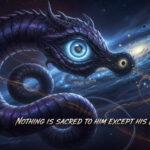
In the annals of mythology and theology, there exists a resonant archetype: the figure who descends from the transcendent realm to emancipate humanity from the darkness of ignorance, only to suffer agonizing punishment by the ruling powers of the age. While the Greeks looked to Prometheus, the titan who defied Olympus, the Christian looks to Jesus, the Incarnation of the Logos. From a Logocentric perspective—where God is understood as the […] Read more »













